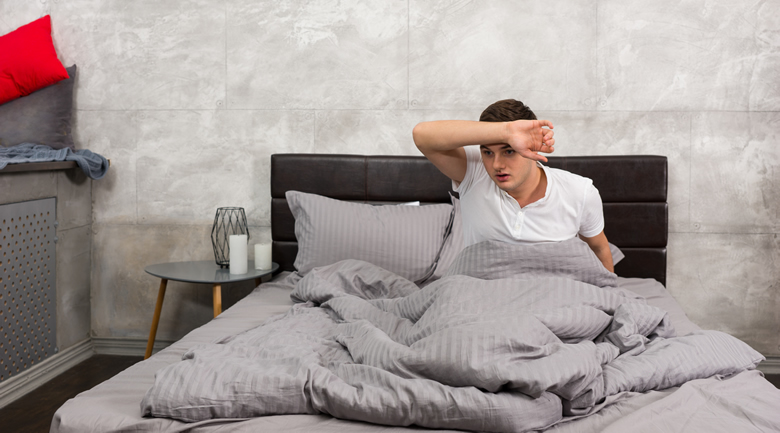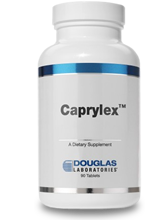Candida/Fungal Overgrowth, Another Cause of Night Sweats

Night Sweats are very common in fibromyalgia, and to a lesser degree in the general population. In two recent newsletters I talked about the role of reproductive and adrenal hormone deficiencies as causes of night sweats. Today I'll discuss another very common problem that triggers night sweats: infections.
Candida is an overgrowth of yeast/fungi (I use the two terms interchangeably in this article). It is a major issue In fibromyalgia and the general population. Unfortunately there's no medical test for this, so a diagnosis can only be made clinically — which to most doctors means that it doesn't exist. And you can't diagnose and treat something if you don't even know it exists!
So how can you tell if you have it? One way is that if you have nasal congestion, sinusitis or irritable bowel syndrome without any apparent causes, then there's a reasonable chance you have Candida overgrowth and should treat it to bring its level in your body back into balance. This not only helps improve your other symptoms, but also helps eliminate your night sweats and even helps decrease your pain, fatigue and brain fog.
So balancing Candida is critical. Now let's discuss how to do it!
Candida/Fungal Overgrowth
Candida occurs primarily in your gut. It creates toxins, sparks inflammation, triggers chronic sinusitis and spastic colon, further weakens your immune system, and generally causes you ill health.
If you have CFS/fibromyalgia, I recommend you just assume you have Candida and address it. Rebalancing Candida often dramatically improves your CFS and fibromyalgia, while also making your sinusitis and spastic colon go away!
It's Easy to Find Out If You Have Candida!
Although there's no lab test that I find reliable to diagnose Candida, the simple yeast questionnaire below can give you a pretty good idea if you have it. (Though as I noted above, if you have CFS/FMS, chronic sinusitis, or unexplained spastic colon, you should just assume you have it and get it addressed.)
Yeast Questionnaire
Answer yes or no to each of the questions below. Your total score will show you the probability that you have yeast overgrowth. Simply total the point values shown in parenthesis for each of the questions you answer "yes" to.
- Have you ever treated for acne using tetracycline, erythromycin or any other antibiotic for a month or longer? (SCORE +50)
- Have you ever taken antibiotics for any type of infection for more than two consecutive months, or for less than two months but did so more than three times during a twelve-month period? (SCORE +50)
- Do you have CFS or fibromyalgia? (SCORE +50)
- Do you have sinusitis or spastic colon? (SCORE +50)
- Have you ever taken an antibiotic? (SCORE +5)
- Have you ever had prostatitis or vaginitis? (SCORE +25)
- Have you ever been pregnant? (SCORE +5)
- Have you ever taken birth control pills? (SCORE +15)
- Have you ever taken corticosteroids such as Prednisone, Cortef or Medrol? (SCORE +15)
- Have you ever had a fungal infection that was difficult to treat (such as jock itch, athlete's foot, or a nail or skin infection)? (SCORE +20)
- Do you crave sugar or breads? (SCORE +20)
- Do you frequently get painful sores inside your mouth (not on your lips)? (SCORE +10)
Add your scores. If the total is 70 or more, then you should consider treatments to rebalance Candida.
How to Balance Candida
Candida is a normal part of our body's flora. So it doesn't need to be completely eliminated. You just need to bring it into balance in your body. You can do that by following the four tips described below (give these at least two months to work).
Tip 1: A Great Probiotic That Will Save You Money
Probiotic supplements supply healthy bacteria to your gut, which helps balance Candida. My favorite product is called Probiotic Pearls Elite™. This supplement contains an amazing 5 billion healthy probiotic yeast-fighting bacteria, using a mix of different Lactobacillus. Unlike most other probiotics, these come in a pearl form that's formulated to resist being destroyed by stomach acid, which means more of the "friendly" bacteria actually reach your intestines.
Be careful when choosing which probiotics brand to use. The supplement industry has recently begun marketing very high-potency probiotics. But there are a couple of problems with most of these. First, stomach acid kills 99% of these high-potency formulations, and dead bacteria don't put up much of a fight for you. And if too many of these get through, they can cause overgrowth of gut bacteria in the small intestine which can actually aggravate your symptoms.
Research suggests that after five months you can decrease from taking one a day to just one every other day, while usually maintaining all the benefits.
Tip 2: Prescription Nystatin and Herbal Alternatives
Nystatin is an antifungal medication typically used to address Candida, but only in the gut. If your insurance covers this, Nystatin can be a reasonable treatment choice to save you the cost of buying herbals. But if your doctor won't prescribe Nystatin for the 3-6 months that it takes to work, or if you just prefer to go naturally, a number of herbals can be very helpful. These include:
- Coconut oil (50% caprylic acid).
- Grapefruit seed extract can be helpful if use the liquid form.
- Berberine sulfate is an excellent herb that also helps optimize blood sugar and cholesterol levels. The dose is 200-500 mg three times a day (note, however, that it can be a bit hard on the stomach).
I like to start people with a caprylic acid supplement called Caprylex™. This is a special well-tolerated complex of pure caprylic acid that's easy on the stomach. Each tablet provides 400 mg of a buffered calcium-magnesium caprylate complex, equivalent to 300 mg of caprylic acid. Caprylex is specially formulated to provide timed, controlled release of caprylic acid throughout the small and large intestine. Other forms can cause nasty acid reflux. Take two tablets daily on an empty stomach at least one half hour before meals. Take it for at least three months. It can be taken at the same time as the probiotic, as well as the Diflucan discussed below.
Tip 3: Diflucan (by Prescription)
The Nystatin, herbals, and probiotics will address Candida overgrowth in the gut. But they aren't absorbed and won't take care of your sinus problems if you have them. They're also not as effective in the short term as a medication called Diflucan.
Ask your holistic doctor to give you a prescription for Diflucan (fluconazole) 200 mg a day for 6 weeks. Regular physicians aren't familiar with this area and generally won't prescribe it, so you'll likely need a holistic doctor to write this prescription for you. Buy a generic form to save money. If you don't have insurance coverage for this, use the free GoodRx website or their mobile app. GoodRx is a wonderful free source of medication discount coupons that can cut most prescription costs by over 90%! For instance, with GoodRx a 6-week course of Diflucan would be $54 instead of the $180 it would cost you without it.
Tip 4: Stay Away From Sugar
This tip isn't new, but it's crucial. Why? Because yeast eat sugar, 24/7. If you feed your yeast, they'll continue to live and multiply. If you don't feed them, they'll die off more easily. If you can't do without sweetening your foods, use a sugar substitute like Stevia. Stevia is natural and healthier than sugar.
Start by cutting out sodas and fruit juices, both of which have a devastating ¾ teaspoon of sugar per ounce. Eating whole fruits is okay in moderation. Diet sodas won't feed the Candida, and Zevia has an excellent product line that you can find in health food stores and even in Safeway.
Sugar-free chocolate is a delicious, healthy, sugar-free sweet treat. Russell Stover makes a good variety that you can find in most grocery stores. Abdallah Candies also makes excellent sugar-free treats. Their website mostly sells chocolate with sugar, but you can also find Abdallah's sugar-free chocolates there.
Do you get gas and loose stools when you eat sugar-free chocolate? This comes from the maltitol used to sweeten it. There's an excellent Stevia-sweetened brand made by Lily's™ Stevia-Sweetened Chocolate, which won't cause this problem. This is my current favorite :-)
Rebalancing Candida in your body is great for getting rid of night sweats. And it can also help your gut and sinuses, as well as your whole body, feel dramatically better!

Jacob Teitelbaum, M.D. is one of the most frequently quoted post viral CFS, fibromyalgia, energy, sleep and pain medical authorities in the world. He is the author of 12 books including You Can Heal from Long Covid, the best-selling From Fatigued to Fantastic!, Pain Free 1-2-3, The Complete Guide to Beating Sugar Addiction, Real Cause Real Cure, The Fatigue and Fibromyalgia Solution, and the popular free Smart Phone app Cures A-Z. He is the lead author of eight research studies and three medical textbook chapters on effective treatment for fibromyalgia and chronic fatigue syndrome. Dr. Teitelbaum appears often as a guest on news and talk shows nationwide, including past appearances on Good Morning America, The Dr. Oz Show, Oprah & Friends, CNN, and FoxNewsHealth.
Websites: Vitality101.com | EndFatigue.com
Facebook Support Group: Recovering from Fibromyalgia, Chronic Fatigue, and Long COVID
Facebook Page | Instagram

